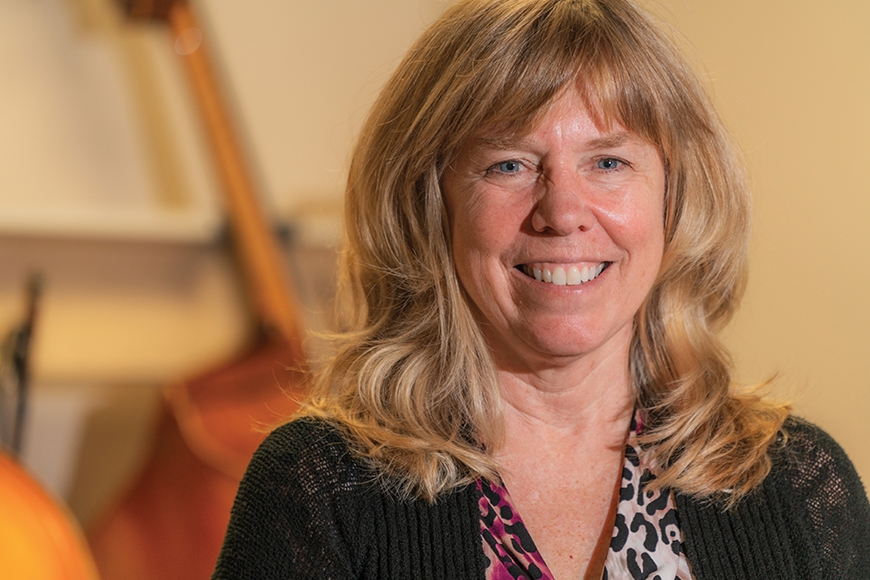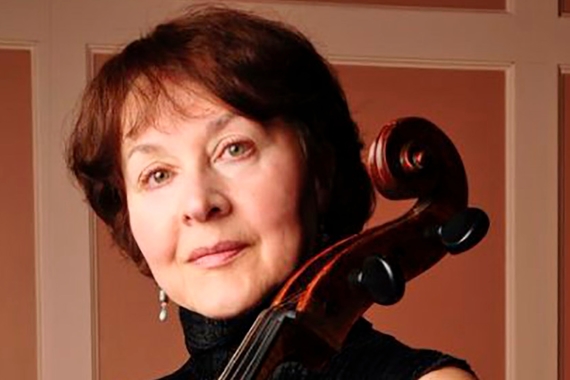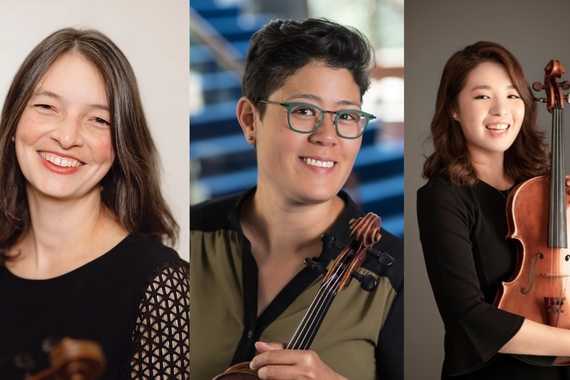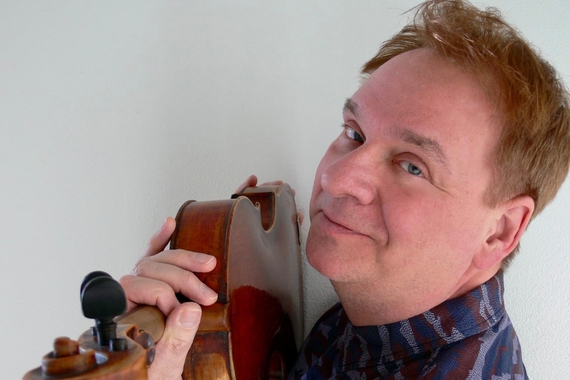Alumni Spotlight: Lorie Hippen – Celebrating a Career in Music Education
Lorie Hippen (BS 1978, violin/music education) welcomes students into her classroom at South High School in Minneapolis. It’s late May, and her string orchestra students unpack, assemble their instruments and music, and warm up.
At the podium, Hippen leads a talented group of roughly 20 students through “Sea to Shining Sea” for South High School’s upcoming graduation ceremony. She prepares them for the graduation venue, the University of Minnesota’s 3M Arena at Mariucci, “this venue is cavernous, nothing is too loud. We’re performing with brass. Be percussive.” The students heed her direction and run through the work again with enthusiasm.
Hippen seems keenly aware of the significance of this moment. She is weeks away from retirement after more than 36 years of teaching in Minnesota public schools, and this will be her final graduating class. She has taught strings to hundreds of students—from kindergarten to 12th grade, from beginning strings to advanced orchestra.
The bell rings, and soon chamber orchestra students enter the classroom, they break out into small groups and get to work. Hippen moves from group to group, restringing a violin on the fly and tuning a cello at record speed. “Thank you, Ms. Hippen, for literally being alive,” a happy recipient of a newly tuned cello says before she begins playing.
Hippen listens in on a duo and hands the students new music. They appear apprehensive as they review the music, but Hippen encourages them, “You’ll love this piece. It doesn’t take monster technique to play, and you just have to be steady.” She successfully calms their nerves, and they tackle the work with renewed confidence.
Hippen is at home in the classroom, “it’s the best job in the world,” she beams while watching small groups of students play. She makes organizing the chaos of a high school classroom appear effortless, and her colleagues know the gift they have in Hippen.
Eric Sayre, band, theory, and composition teacher at South High shares, “Lorie is the real deal. She puts the interests and needs of her students first. Ms. Hippen has remained optimistic and innovative for over 30 years of educating, and that is no small feat. She has been an inclusive and encouraging teacher of a diverse cast of students, and has in an ever-changing musical world, kept strings relevant to our students. Also, she is awesome to share an office with!”
South High choir teacher Laurie Meyers agrees, “Lorie Hippen is a generous, warm, inviting, and collaborative colleague of the highest skill level. She is a wonderful musician and a nurturing presence to all who encounter her. We will greatly miss her at South!”
Between classes, Hippen took some time to reflect on her musical journey and answer questions.
What inspired you to become a musician?
My family didn’t have music degrees, but I remember my aunts and uncles singing “Happy Birthday” in four-part harmony. They sang and harmonized beautifully without music. Music was in the air my whole life. I was four years old when I learned piano. It was at school that I continued, and the music specialists introduced four string instruments. I attended Riverside Elementary School, Portland Junior High School, and Kennedy Senior High School in Bloomington, MN.
I took lessons with Richard Adams; I had a good teacher right away. But what guided me was the junior high orchestra, my instructor at the time was a Juilliard graduate and a fabulous violinist named John Dennis. He would come up to me and play the Tchaikovsky Violin Concerto close in my ear where I could see him, and he made a habit of coming up to me and playing like that. He complimented me once, we were playing a reduced abridged version of Beethoven’s 7th, and I did a rhythm right, and he recognized it—it was his positive reinforcement that motivated me.
Did this shape your desire to become a music educator?
Oh yes, many of John Dennis’ students went on to become music teachers. Many of my graduating class of musicians at the U of M became orchestra teachers. Some of them are retired, and some are still out teaching in the public schools. This was a result of U of M orchestra Professor Richard Massmann and music education Professors Stephen Schultz and Edgar Turrentine. Those were the big three that shepherded the music education majors. I learned a lot from them. They were fabulous. Just looking at the University Orchestra when I was there, I can name about ten other students who became orchestra teachers. And they could play—they were great players.
Is there something that you learned from your professors at the U of M that you pass down to your students?
Anything to do with violin pedagogy or teaching violinists or violists technique-wise, much of it came from faculty member Mary West. I use it all the time.
What was the transition from college to teaching like for you?
I had a Suzuki studio for a year because I had the training from faculty member Mark Bjork at the U. I had a lot of private students and I did a fair amount of private teaching while I was in grad school. In 1981, I decided to try the school route, and I got the job.
What are some of the daily challenges you face as a music educator?
The challenges are meeting each student as an individual and really knowing each one of them and what it takes to get each student to the next level. That can be challenging, and it takes some doing. You have to be empathetic. You have to get under their skin and figure out what are they feeling. That takes some intuition. You have to figure out what they need by observing them and talking with them. All day long I walk around and say ‘how’s it going’ and connect with them and encourage students to connect with each other. That’s important. In the pursuit of making music, you are going to have to connect with others. We’re not all soloists; we’re part of a group.
That sounds like psychological background work that you are doing—how do they react to praise or correction?
You have to help students progress without crushing their spirits, and you have to be very tactful and positive. Students have to believe that they are getting better and you find something to compliment as they progress.
How many students do you see throughout the day?
I teach 50 to 60 string students and as well as around 35 piano students. In the past, I have taught as many as 240 students at a time, that was a challenge. This was at Justice Page School in Minneapolis (formerly Ramsey School). In a program started by Richard Green, all the children from first to fifth grade were required to play a string instrument. It was a unique situation, and it received national attention. We were of the belief that no child should be denied the chance to learn how to play. Because violins come in different sizes, you can easily give one to a first grader. We taught the students to read music, we had seven orchestras, and all kinds of world-class artists came to visit the school. I taught at Justice Page School for 19 years before coming to South High School. My experience there was formative in shaping my teaching philosophy that all kids should be given the opportunity to learn to play.
What’s your favorite part of the day?
I really admire, respect, and enjoy my collaborating with my colleagues. They are top drawer, all three of them. A gratifying part of teaching is when there’s improvement in the performance ensembles, and the students know that they got better and were successful. I compliment them, and it’s rewarding to see the looks on their faces and their smiles. My favorite part of teaching is their reaction to success.
You are retiring this year, what’s next for you?
I’ve been on faculty at MacPhail for more than 15 years; I’ll continue there. I’ll also continue to work as a clinician for orchestras and festivals, as well as performing with the Minneapolis Pops Orchestra, and others.
You’ve had a long and rewarding career in music education—what kept you going throughout the years?
Many of my students go on to become performance majors, some become teachers, and that’s very heartening to see. The same way I saw the importance of music education at a young age, these students also understand how vital music education is, and the cycle continues.



